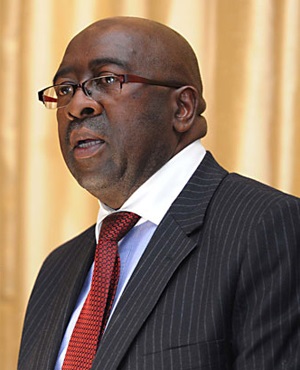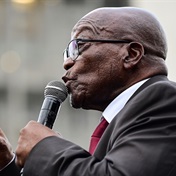
As far as our leaders across the length and breadth of our continent are concerned, good economic governance, including the transparent management of a country’s finances, is a prerequisite for the promotion of economic growth and development.
Good governance embraces political representativeness, institutional effectiveness and robust economic management.
It emphasises transparency, accountability and participation. It implies creating political and economic processes that are conducive to sustainable economic development.
A country with good governance does not only manage its democratic affairs in a transparent and accountable manner, but also safeguards the rule of law.
It does all of this while ensuring the concerns of the most disadvantaged are prioritised. But those who constitute and run governments often fail to live up to this promise.
That is why our founding fathers and mothers deemed it necessary that South Africa be a constitutional democracy, where constitutional provisions can be segmented into two broad categories.
There are those provisions that constrain or limit those in power from certain acts, such as torture or the use of the death penalty. The other group of constitutional provisions are those that facilitate or enable the state to do certain things.
Our Constitution went further than most by creating a number of independent institutions (chapter 9s) to strengthen democracy and promote respect for human rights.
But there are a number of other institutions that perform myriad functions that affect the objectives of efficiency and equity in a market economy.
Firstly, by protecting property rights, guaranteeing the sanctity of contracts and by providing law and order more generally, institutions create markets and an environment in which business and private investment can flourish.
Having a well-functioning judiciary, an efficient bureaucracy and police is key to the development of markets.
Secondly, markets need to be regulated. Institutions fulfil this role that arises either from market failure or social objectives such as the transformation of our society to make up for the denial of opportunity to millions of South Africans under apartheid.
Thirdly, institutions such as the SA Reserve Bank and National Treasury stabilise markets by ensuring low inflation and macroeconomic stability, and help to avoid financial crises.
Finally, institutions legitimise markets through mechanisms of social protection and insurance. Our social grants system, for example, has provided a safety net for the most vulnerable segments of our society. A well-functioning democracy is what’s required to legitimise markets.
Now let me deal with the role of the financial sector in economic development, and the links between financial regulation and the progressive realisation of socioeconomic rights.
The financial services sector is at the heart of the economy. It enables citizens to make daily economic transactions, save and preserve wealth, and insure against personal disaster.
The financial sector also enables economic growth, job creation, the building of vital infrastructure, and sustainable development for South Africa and its people.
Every economic activity has a financial element, and the functioning of the financial sector is vital for the effective and efficient workings of an economy. That, in a nutshell, is why the financial sector is more closely regulated than any other sector of the economy.
But the special nature of the financial sector, and the need to regulate it closely, confuses some people about the role of the regulation and regulators, a function that, in the case of banks, is filled by the banking supervision department of the SA Reserve Bank.
The Financial Services Board, on the other hand, regulates nonbanking financial institutions such as insurance companies, investment companies and fund managers.
This arrangement will change soon, resulting in the creation of two institutions: one focused on the prudential regulation of the entire financial sector and another to regulate market conduct.
We used to say during the struggle against apartheid that there can be no normal sport in an abnormal society. Equally, you cannot have stable institutions in an unstable financial system.
The regulation of the financial sector must be left to regulators who play their role without fear or favour. Professor Kader Asmal and all those who marshalled our Constitution from infancy were most keenly aware of this.
They ensured the independence of the SA Reserve Bank is enshrined in the Constitution.
It is vitally important that we not only protect the independence of our institutions from undue influence and capture by unruly elements, but that in our conduct and in our demands for socioeconomic transformation, we strike a balance between goals and means.
Policy makers and regulators must balance the multiple trade-offs and competing objectives. A careful balance needs to be struck for the progressive realisation of the socioeconomic rights enshrined in our Bill of Rights.
Asmal has been described as a man of boundless energy, patience and brilliance, coupled with a moral compass. He has also been referred to as a man intensely human in his emotions and relationships.
He carried our country’s Constitution in his heart. He was never without it. I recall one instance when he came to address the ANC caucus in Parliament.
He explained the clauses of the Constitution that were relevant for that day’s discussion without referring to the document itself. But it was his voice that said it all, capturing not only his deep knowledge of the various clauses of the Constitution, but his intimacy with the text.
Asmal’s intimacy with the Constitution was based on the understanding that it entrenches democratic values, culture, practices, universal principles of human rights, justice and the rule of law.
We may not match Asmal’s brilliance, but at least we can try to come close to matching his energy, patience and intense humanity.
We need boundless energy and patience if we are to defend our democratic values and the rule of law. Those who undermine the rule of law and our democratic values have displayed no less. Let’s redouble our efforts.
Nene is the former minister of finance. This is an edited extract of a speech he delivered at the fourth annual Kader Asmal Human Rights Lecture on Wednesday




 Publications
Publications
 Partners
Partners








